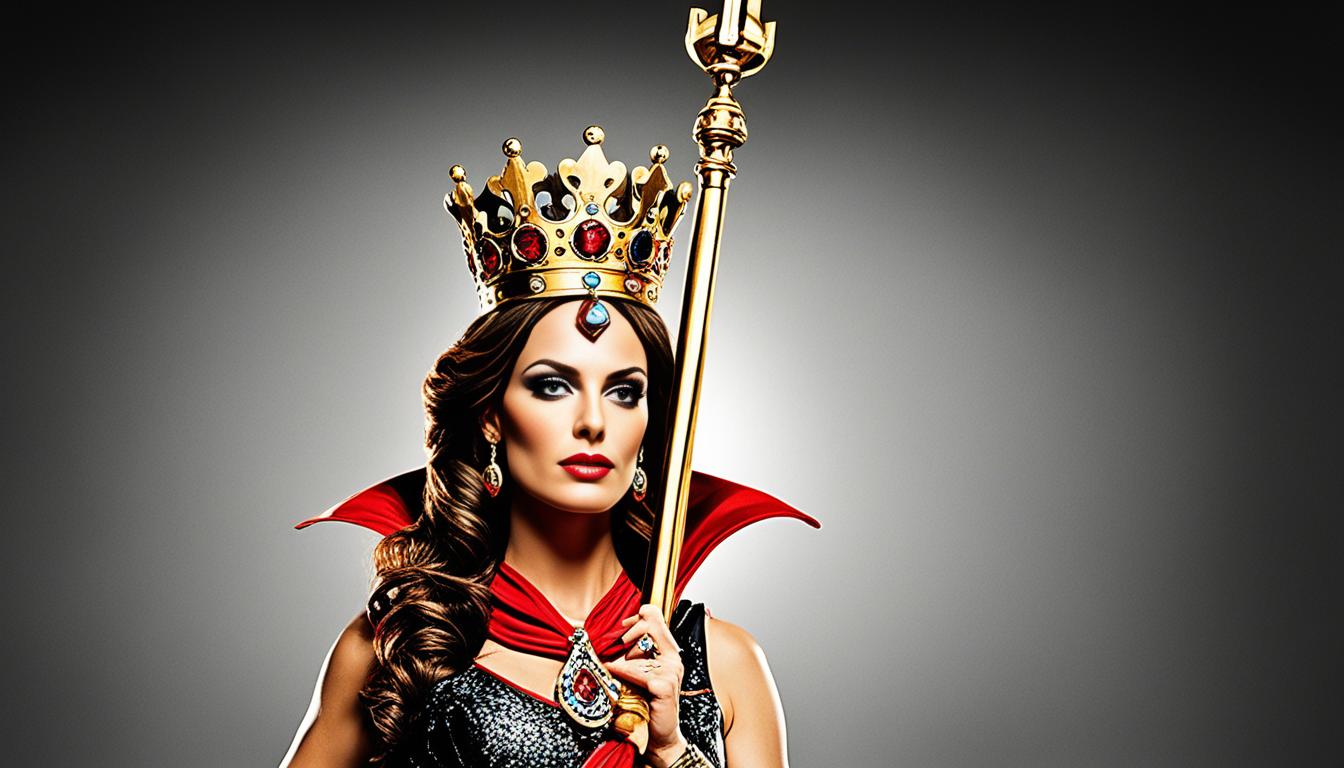Jezebel in the Bible is often portrayed as a wicked and infamous character. Her story, as the wife of King Ahab and a queen in the ancient Israelite kingdom, is filled with power, intrigue, and controversy. Known for her influence, downfall, and the wickedness attributed to her, Jezebel’s legacy continues to captivate readers and scholars alike.
Despite her villainous reputation, recent scholarship has shed new light on Jezebel’s character and motivations. By examining her story within the historical context and considering the biases of the biblical authors, a more complex and nuanced understanding of Jezebel emerges.
Key Takeaways:
- Jezebel in the Bible is often portrayed as a wicked and infamous character.
- Her story revolves around her role as the wife of King Ahab and a queen in ancient Israel.
- Jezebel’s influence, downfall, and wickedness are key aspects of her story.
- Recent scholarship encourages a more nuanced understanding of Jezebel’s character.
- Examining her story within the historical context and considering biases is crucial to understanding Jezebel.
Jezebel in the Bible: A Troubled Reign
The story of Jezebel in the Bible revolves around her marriage to King Ahab of Israel, a union that was primarily a political alliance. Jezebel, a Phoenician princess, brought with her the worship of the Phoenician gods, including Baal and Asherah. This clashed with the monotheistic worship of Yahweh in Israel and led to tensions within the kingdom. From the perspective of the Deuteronomist, who wrote the Books of Kings, Jezebel symbolized the idolatrous practices that needed to be eradicated from Israel. Her actions, such as promoting the worship of Baal and persecuting the prophets of Yahweh, were seen as contributing to Israel’s apostasy and downfall.
In Jezebel’s time, the reigning monarchs were not only political leaders but also religious figures responsible for guiding the worship practices of their people. Jezebel’s religion, rooted in the worship of Baal, was a direct challenge to the religious order established in Israel. The Deuteronomistic History, which includes the Books of Kings, presents a biased interpretation of Jezebel’s actions, emphasizing her wickedness and the dire consequences that befell Israel as a result.
Jezebel is depicted as a villain in the Bible, serving as a cautionary tale for those who would stray from the worship of Yahweh. Her reign is seen as a turning point in Israel’s history, marking a decline in its commitment to monotheism.
However, it is important to recognize the limitations of this portrayal and consider the historical context. Jezebel’s actions can be understood within the broader political and religious landscape of her time. The worship of Baal was widespread in the ancient Near East, and Jezebel’s support for this religion was more in line with the practices of her homeland, Phoenicia. Her marriage to Ahab was not only a political arrangement but also a means of strengthening alliances between Israel and Phoenicia. Jezebel’s desire to promote her own religious beliefs and maintain her cultural identity must be taken into account when evaluating her reign.
It is also essential to approach the Deuteronomistic History with a critical eye. The narrative was shaped by the theological and political biases of its authors, who sought to promote a specific religious agenda. Their interpretation of Jezebel’s actions may have been influenced by their desire to condemn idolatry and uphold the worship of Yahweh as the only acceptable form of religious practice.
Exploring Jezebel’s reign within the political, religious, and cultural context of her time allows for a more comprehensive understanding of her role in biblical history. While her actions may have contributed to Israel’s downfall, it is important to analyze her character and motivations with nuance and empathy.
Throughout history, powerful women like Jezebel have often been vilified and their reputations distorted to serve specific narratives. By critically examining the story of Jezebel, we can challenge these stereotypes and gain a deeper appreciation for the complexities of biblical characters.
Jezebel in the Bible: Assessing Her Character
While Jezebel’s actions are often condemned in the Bible, there is room for interpretation when it comes to her character and motives.
Some scholars argue that she was simply a product of her time and circumstance, fulfilling her role as a queen in a politically charged environment.
Others suggest that Jezebel may have had genuine beliefs in the Phoenician gods and sought to promote religious tolerance or cultural pluralism.
It is important to evaluate the narrative from Jezebel’s perspective and consider the biases and intentions of the biblical authors.
By doing so, a more nuanced understanding of her character can emerge, acknowledging both her flaws and the complexities of her role in biblical history.
“Jezebel’s character is often portrayed in a one-dimensional way, but it is crucial to analyze her motives and actions within the context of her time. As queen, she faced immense political pressure and adhered to the religious practices of her culture. To label her solely as a villain overlooks the complexities and humanity of her character.”
When assessing Jezebel’s character, it is imperative to engage in biblical interpretation that goes beyond surface-level judgment.
By delving deeper into her story, we can gain insight into the nuances of her motives and the societal forces that shaped her actions.
Was she driven by ambition, a desire for power, or was she a victim of circumstances beyond her control?
Ultimately, the answer lies in the intersection of historical context, personal agency, and the intentions of the biblical writers.
Recognizing the complexity of Jezebel’s character allows us to move beyond simplistic notions of “villain or victim” and embrace a more comprehensive understanding of her role in biblical history.

The Legacy of Jezebel in the Bible
Jezebel’s story in the Bible has left a significant impact on cultural perceptions of powerful and influential women. Throughout history, she has been vilified and demonized as a symbol of wickedness and seduction. Her name has become synonymous with immoral behavior and manipulative tendencies, perpetuating a negative reputation.
“Jezebel was once the epitome of feminine evil.
The embodiment of wickedness and temptation, her name became a cultural shorthand for any woman considered immoral or promiscuous.”
However, it is crucial to critically examine Jezebel’s legacy and question the biases and stereotypes that have shaped popular understanding. Viewing her story through a nuanced lens allows for a more balanced perspective.
Jezebel’s legacy extends beyond the biblical narrative. Cultural associations with her name have influenced how society perceives powerful women throughout the ages. The notion of the “Jezebel spirit,” characterized by manipulation and destruction, is deeply ingrained in cultural consciousness.
It is important to recognize that Jezebel’s story is shaped by the historical and political context in which she lived. The biblical authors had specific intentions and biases that influenced their portrayal of her. By considering these factors, we can gain a deeper understanding of Jezebel and challenge the one-dimensional depiction that has persisted for centuries.
Jezebel’s reputation serves as a reminder of the need for critical interpretation and a reevaluation of historical figures. By exploring the complexities of her character and the cultural associations that have developed over time, we can unravel the layers of her story and uncover new insights into the role of powerful women in biblical history.

Conclusion
Reevaluating the story of Jezebel in the Bible allows us to gain a more nuanced understanding of her complex character and motivations. While her actions may still be seen as morally questionable, it is crucial to consider the historical and religious context of the time. By recognizing the biases of the biblical authors and the political tensions that surrounded Jezebel, we can challenge and deconstruct the negative stereotypes that have been associated with her for centuries.
Delving deeper into Jezebel’s story provides us with new insights into the role of powerful women in biblical history. It prompts us to question the traditional narratives and seek a more critical interpretation. By doing so, we can appreciate the significance of historical context in shaping characters and their actions, avoiding simplistic judgments based on preconceived notions.
In reevaluating Jezebel, we invite a reexamination of how we understand women in biblical texts. The complexity of her character reminds us that women in power, just like men, can have multifaceted motivations and navigate intricate political landscapes. By embracing a more comprehensive perspective, we can uncover untold stories and empower a more inclusive understanding of biblical history.
FAQ
Who was Jezebel in the Bible?
Jezebel was a biblical character and the wife of King Ahab of Israel. She is known for her involvement in promoting the worship of Phoenician gods, such as Baal and Asherah, which clashed with the monotheistic worship of Yahweh. Her actions have made her one of the most infamous women in the Bible.
What was Jezebel’s role in Israel?
Jezebel’s marriage to King Ahab was a political alliance aimed at strengthening ties between Israel and Phoenicia. She brought with her the worship of Phoenician gods, which led to tensions within the kingdom and the promotion of idolatrous practices.
How is Jezebel portrayed in the Bible?
In the Bible, Jezebel is depicted as a wicked queen who promotes the worship of false gods and persecutes the prophets of Yahweh. She is seen as a symbol of idolatrous practices and the downfall of Israel.
Was Jezebel solely responsible for Israel’s apostasy and downfall?
While Jezebel played a significant role in promoting idolatrous practices, it is important to consider the broader political and religious tensions of the time. The biblical narrative may have exaggerated her influence for dramatic effect.
How should we interpret Jezebel’s character?
Interpreting Jezebel’s character requires considering the biases of the biblical authors and understanding the historical context. Some scholars argue that Jezebel was a product of her time and fulfilling her role as a queen in a politically charged environment.
What is Jezebel’s legacy?
Jezebel’s story has had a lasting impact on cultural perceptions of powerful and influential women. She is often vilified as a symbol of wickedness and seduction, with her name used to denote immoral behavior.







